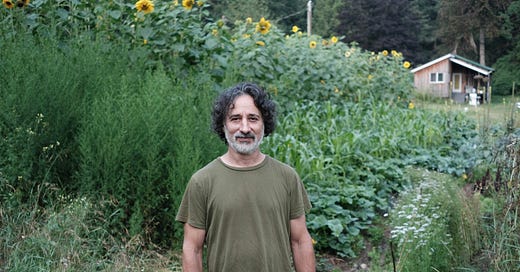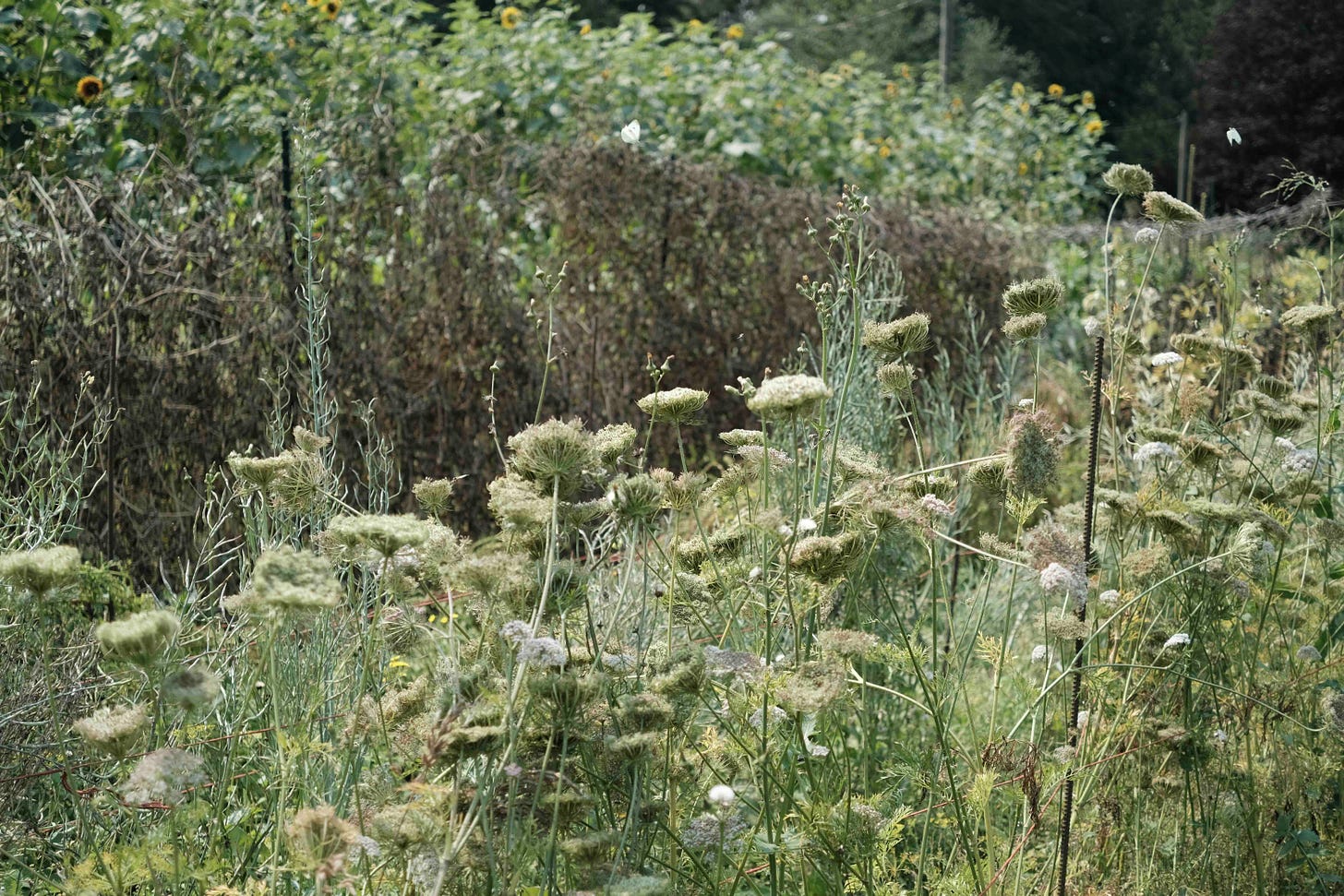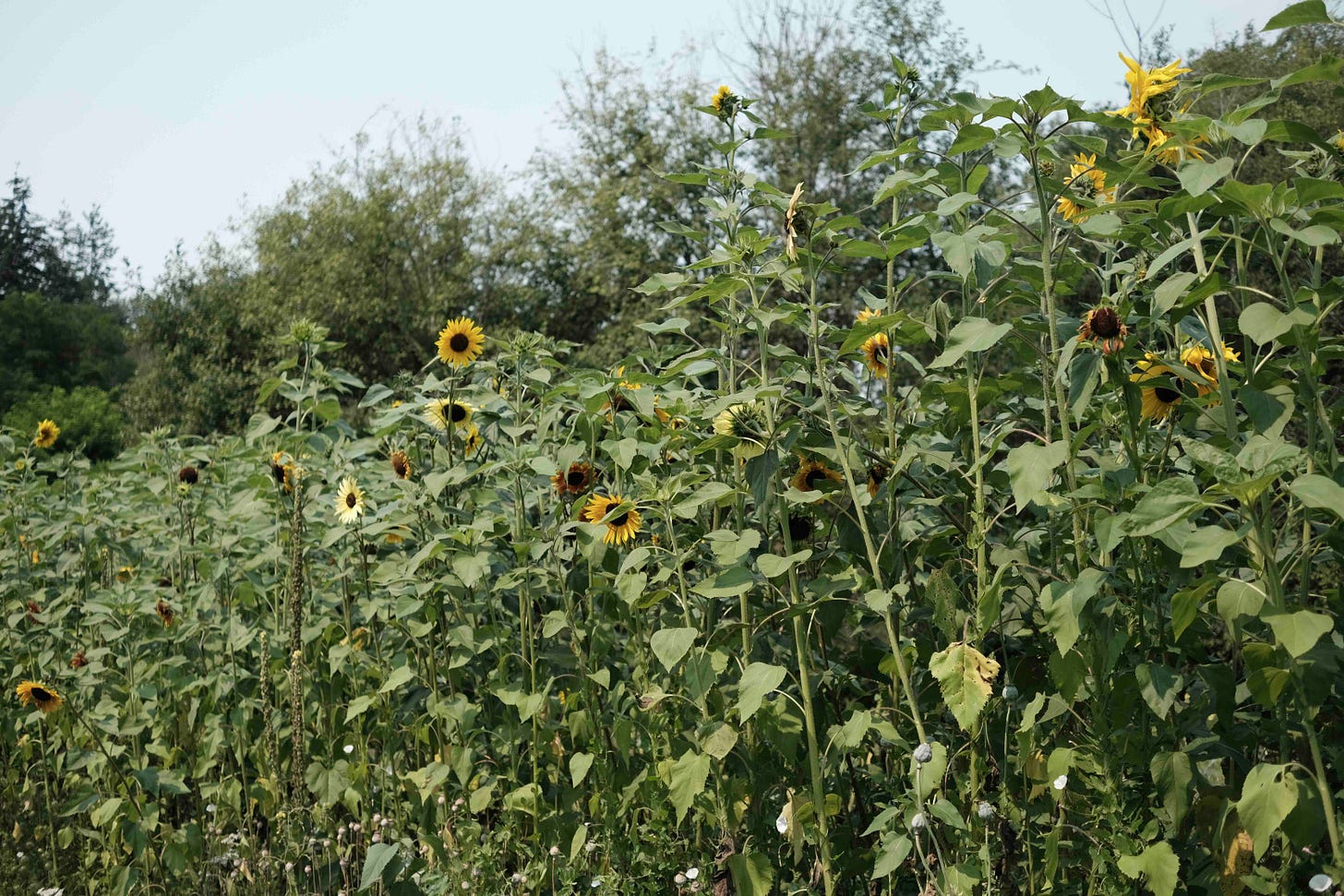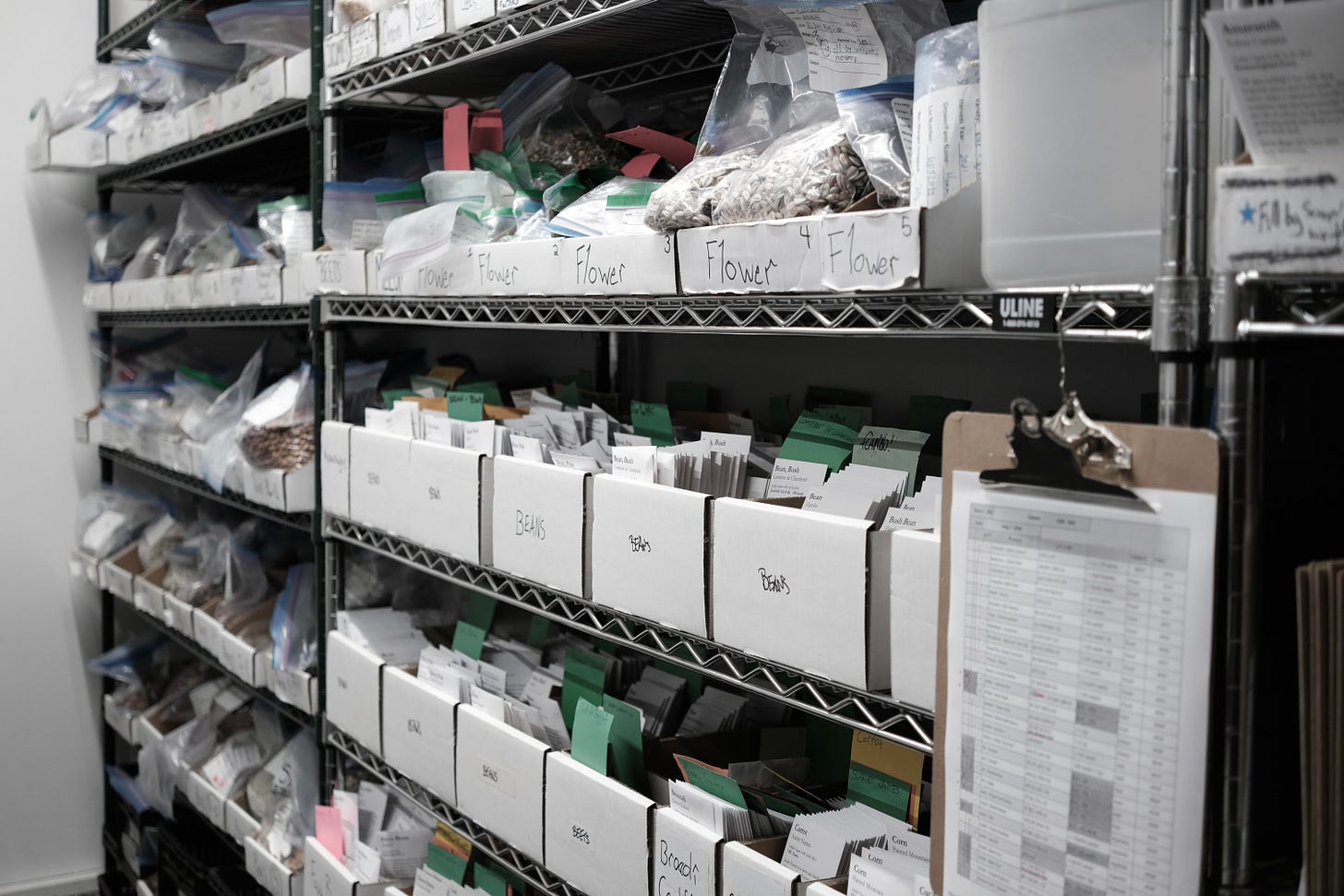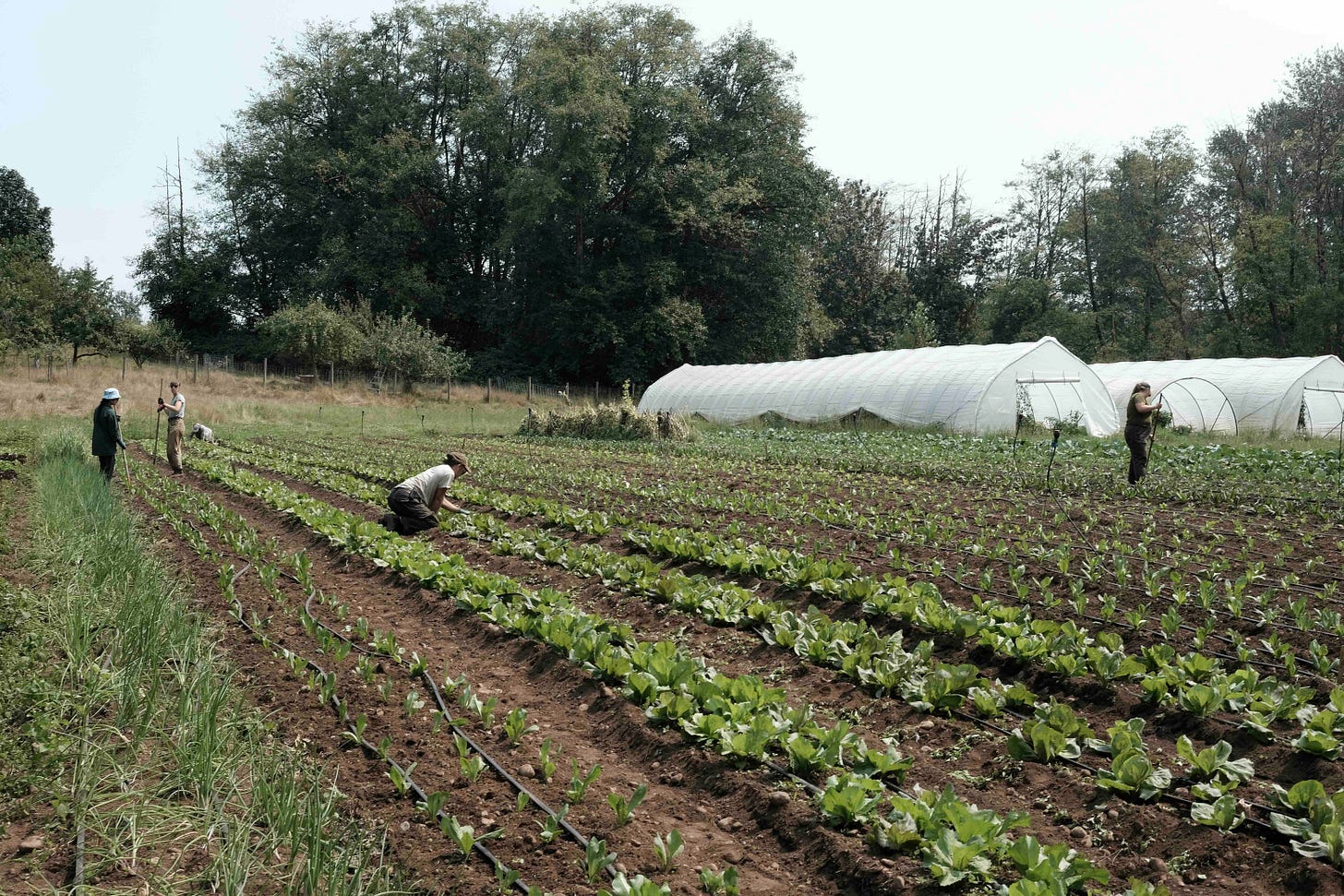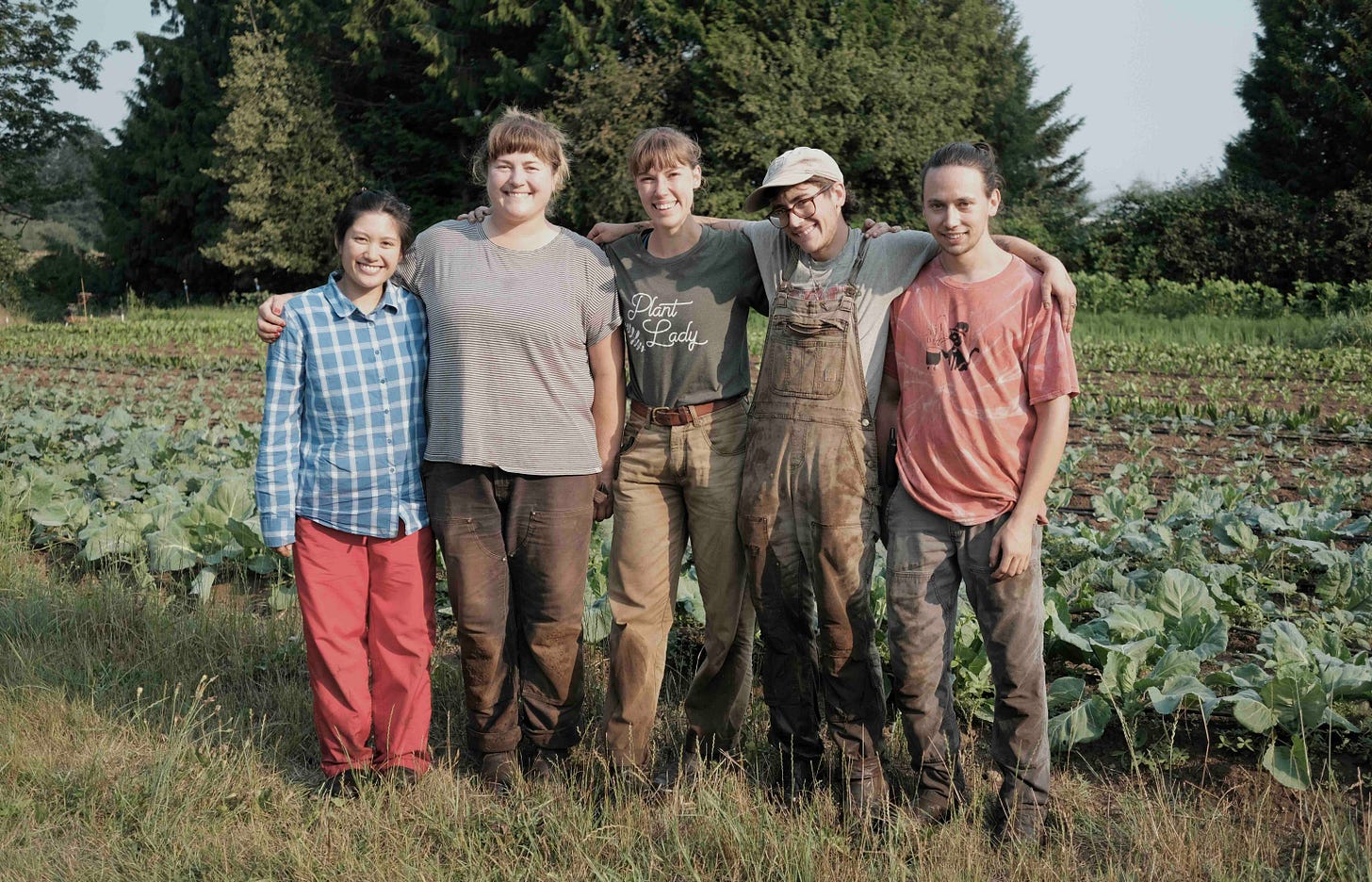The motivation for my Churchill Fellowship was predominantly anchored in science and logic. The combination of rules around variety registration, Brexit, the continued emergence of GMO and a seemingly dwindling number of organic plant breeders in the UK had led to a sense of urgency in me to take action. I wanted to travel to a place with a thriving seed movement, unrestricted by some of the rules and legislation we have, to learn from seed stewards who have more freedom in their practice. My thought was to return with facts and data on what could be possible if our laws on growing heterogenous crops are changed. But as I have travelled around, what has emerged as the essence of this trip is not necessarily the science behind seed work, but the relationships.
As Carol Deppe proclaimed when I met her back in June – ‘we breed our values right into our varieties’. Without a diversity of people doing this important work for a diversity of reasons, I feel we will always struggle to find a truly resilient seed system. Everyone who nurtures and stewards a seed crop will do it in their own unique way. There isn’t one way to solve this problem: there isn’t a silver bullet answer. There are many ways, many relationships, many answers. Which is why inspiring curiosity in others in the practice of seed keeping feels so vital. The Gaia Foundation’s Seed Sovereignty Programme in the UK has been carrying out this crucial work for several years now. And one of the original inspirations for the programme was the work of the Bauta Family Initiative on Canadian Seed Security. So it was with much excitement that I travelled across the border from the US into Canada to spend some time with their B.C regional representative, David Catzel.
David is the B.C Seed Security Programme Manager for FarmFolk CityFolk (FFCF) - British Columbia’s oldest and largest food and agricultural nonprofit organisation. The Bauta Family Initiative often partner with existing regional organisations such as FFCF, who already have seed work integrated into their programme, so David’s role, although regional, is part of Bauta’s national seed movement.
David is based at Fraser Common Farm, a cooperatively owned community farm in the Fraser Valley, just southeast of Vancouver. It is from this beautiful farm that he carries out much of his work, and where he kindly offered to host me for my visit. A hub of the local community for over 40 years, Fraser Common Farm is home and friends to many of the region’s nonprofit organisations, including Glorious Organics, FarmFolk CityFolk and the B.C Eco Seed Co-op office.
David has been involved in farming in the region for over 20 years, and subsequently has a vast network of connections in the seed world and beyond. In his role with FFCF, he supports local seed production and seed security by providing seed education, skills training and infrastructure to increase production of high-quality seed bred and adapted for the B.C climate. At Fraser Common Farm he stewards several seed crops: some regional trials including the BC medicinal plant and seed project, and nationwide initiatives like the Canadian Organic Vegetable Improvement Project (CANOVI) heat tolerant lettuce trials. Off farm, he frequently visits seed growers in the network to offer support and mentorship.
‘A big part of diversity is having more growers growing seed. 200 years ago, every farmer and gardener grew some seeds and I can imagine if I grew a broccoli and you grew a broccoli and someone else grew a broccoli, they’re all going to diverge a little bit and there’ll be diversity in that. Now when we have all our broccoli coming from 5 fields around the world or something, we’ve just lost this incredible resource which is the diversity of the number of people saving seeds and doing selections in different areas. I would love to get back to all farmers growing seed.’
From farmer field days, mentorship programmes to citizen seed trials, David and the B.C Seed Security programme support as many people as possible to participate in the seed growing process. And they don’t just work with farmers, they have a diversity of approaches to maximise impact and really get people thinking about seed. As their name suggests, FFCF also engage with those outside the realm of land work, hosting annual Feast of Fields events to strengthen connections between farm folks and city folks through celebration. Much like the work of the Culinary Breeding Network, these events help to bridge the gap between consumer and farmers and raise awareness of the complex journey of food from seed to plate.
‘I love getting people excited about growing seed – especially farmers! It’s not that hard, most of them do save some seed, they don’t think they’re good at it, so I feel like a big part of my job is encouraging them that they have the skills to do this. Farmers know best how to select seed - it’s being done in their field - of course they’re going to select seeds that work for them. Encouraging them that they know how to select, they know how to observe crops and choose them, and the other part is encouraging people to think of themselves as seed breeders and not seed savers. If you’re doing a good job of seed saving then you’re seed breeding. You don’t have to breed a new variety to do breeding. If you do any selection at all you’re doing breeding work. Just to encourage people that this is not necessarily about academia, especially the type of breeding we’re talking about: open pollinated, natural plant pollination, observation and selection. That’s something every farmer has the expertise to do. If you’re doing a good stewarding job of a variety then you’re actually breeding the seeds of the future.’
Empowering farmers to step back into the role of seed stewards and recognise the significance of the work that they do is a vital piece of David’s role. As our climate shifts and changes, participatory and farmer-led breeding offers a very viable solution to seed security. Having more people carrying out this work with a diversity of approaches is critical, and looking to the future is key:
‘You don’t know anymore if you’re going to have a cool season or a hot season or if it’s going to be extremely cold and wet in the spring and then drought conditions by the end of June. I think if you are breeding a uniform crop that does well in drought then you also need one that’s bred to do well in wet seasons, and you’ve got to grow both of them. Or, you breed more diverse populations then you’re always going to get a yield each year, and in some ways there’s going to be self selection happening every year you save seed.
There are some great heirlooms, there are these beautiful heirloom tomatoes that make delicious tomatoes, and you get one delicious tomato off the plant! Lets work on that, lets breed a new variety that makes many delicious tomatoes on a plant. There’s a farmer on the sunshine coast that we work with who likes to say ‘Our job is to breed the heirlooms of tomorrow’. The breeder continuously selecting varieties so it’s still in catalogues in 50 years because its diverse enough to weather the storm of different climate changes.’
David and I had many conversations throughout the week comparing notes on the commonality between our seed programmes. One big similarity was the importance of making space to listen, of creating conditions for connection and following patterns of natural emergence. An incredible outcome of FarmFolk CityFolk’s grassroots work has been the BC Eco Seed Co-op. Started in 2012 by a handful of farmers who loved seed saving, FFCF supported them in their mission to increase the quantity and quality of ecological and organic seed grown in BC. The Co-op has since grown from strength to strength and currently has 30+ members on farms across the province. The motivation behind the Co-op was to promote the benefits of locally adapted, well grown seed and provide an outlet for sharing the abundance that those growing seed crops were finding themselves with. As David explained, ‘there were always lots of people saving seed, it might not have been incorporated in their business plan, but they saved seed.’ The Co-op offers an alternative income stream for those farmers, and for those interested in diversifying. Many members are market farmers who grow one or two seed crops each year. The Co-op allows members to pool resources, infrastructure and marketing as well as generating a collaborative space for sharing of ideas and support.
And more and more members join the co-op each year. In response to this growing number of people interested in producing seed and to help build capacity for organic seed production in the province, FarmFolk CityFolk have provided three mobile seed cleaning trailers equipped with an array of cleaning tools and equipment. Every season, David and the team tour the trailers around the region, visiting farmers and community groups who would otherwise have to rely on cleaning their seed by hand. These trailers are a valuable resource for the local seed network – increasing efficiency and reducing labour costs while improving the quality of the finished product, as well as providing yet another opportunity to bring seed producers together and create a community around seed.
One of the joys of my week at Fraser Common Farm was in experiencing the community that has emerged there. With several organisations and businesses based on site, there is inevitable cross pollination. Glorious Organics is the main farming business on the property. Primarily growing organic vegetable, flowers and fruit for local restaurants, farmers markets and a CSA scheme, they also grow and sell seed for BC Eco Seed Co-op. Glorious Organics is managed by Mark, Cassie and Susan, and their ethos is rooted in cooperation, communication and community. I had heard about Glorious Organics through the radicchio network – fellow lovers of this bitter veg, Mark was one of the farmers on the Culinary Breeding Network’s visit to Italy several years ago, and works closely with Lane at CBN and Brian at Uprising Seeds. Living up to expectation, the fields were plentiful with chicory when I visited, alongside a wide diversity of vegetables and those all-important seed crops. Every year, the Glorious Organics team grow several seed crops for B.C Eco Seed Co-op - when I visited the fava beans were drying down perfectly in the august sunshine – and as they are based on site they get access to David’s help and expertise and the convenience of the seed cleaning equipment.
I got to spend just a snippet of time with the Glorious Organics team, but it was clear that they are a passionate and dedicated team, committed to growing sustainable and nutritious food and embracing the community that supports and surrounds them. It was impressive to see the common thread of seed weaving all these amazing businesses together on one site, and having an impact on so many people who pass through this farm. As I have been meeting all these wonderful people - at Fraser Common Farm and throughout the entirety of my travels - what occurs to me is that increasing diversity in our seed system is not just about increasing plant genetics, but proliferating intentional stewardship. And with more people doing this work in their own unique ways, diversity will naturally flourish.

